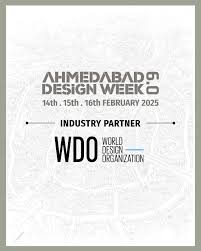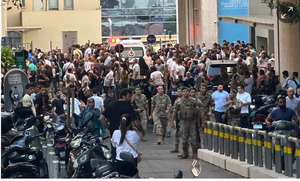Ahmedabad Design Week 6.0 Champions Innovation, Sustainability, and Shared Creativity
The theme of Ahmedabad Design Week 6.0 : SHARED SIGNATURES
Visionaries Redefine Design Frontiers with Innovation and Sustainability
Experts Champion Creativity, AI, and Sustainability in Design


- BILKULONLINE
- By Rafat Quadri
Ahmedabad, Feb 16: Ahmedabad Design Week 6.0 has showcased the power of collaboration in design with its theme, “Shared Signatures.” The event highlighted how individual creativity, when merged with a collective vision, can lead to innovative, sustainable, and inclusive solutions.
In an era where interdisciplinary collaboration is reshaping the future, Ahmedabad Design Week brings together designers, innovators, and thinkers from diverse backgrounds to explore the transformative potential of co-creation. The platform served as a melting pot of cultures, technologies, and ideas, emphasizing the lasting impact of unity in design.
Participants are getting the opportunity to engage, inspire, and collaborate, leaving behind a shared legacy in the ever-evolving world of design. Ahmedabad Design Week 6.0 promises to be a testament to what can be achieved when creativity meets a common purpose, shaping a future where every signature is shared, and every creation tells a story of unity in diversity.
The second day of ADW 6.0, themed ‘Shared Signatures,’ commenced on Saturday with an inspiring inauguration by a stellar lineup of design visionaries.
Among them were Ritesh Hada, President of Karnavati University, philanthropist Umang Hutheesing, WDO President Thomas Garvey, World Design Organisation President-elect Pradyumna Vyas, Academy Award-winning sound designer Resul Pookutty, and Head of Institution of Unitedworld Institute of Design, Col. Surojit Bose. They emphasized the need for designers to move beyond set territories in an ever-evolving global landscape where India is emerging as a key player.

The prestigious Venus Design Excellence Awards followed, honoring Dr. Vibhor, Urmila Kanoria, Dadi Pudumjee, Dr. Lalit Das, Biman Das, Bose Krishnamachari, N. Mahesh, and Pramod Agarwal. These distinguished individuals have significantly contributed to various design disciplines, strengthening India’s presence in the global design industry.
The day featured a diverse array of workshops, starting with an eye-opening session on upcycling by Renu Pokharna. She encouraged participants to assess their clothing consumption in comparison to their household staff, highlighting wealth disparities. She further introduced initiatives by India Recycles, including thrift pop-ups and upcycled products, followed by an engaging hands-on product development exercise.
Gajesh Mitkari of Studio Modak conducted a workshop on personal branding, emphasizing purpose, positioning, identity, and visual elements. He urged participants to engage in introspection, field research, and creative ownership in building their brand identity.
Jay Thakkar’s workshop delved into game design as cultural storytelling, guiding participants in creating games inspired by Indian epics while exploring narrative structures, mechanics, and educational impacts.
Manish Bhatt of Scarecrow Communications offered a unique sensory experience by blindfolding the audience, leading them through an immersive journey into the evolving world of advertising. His session underscored the importance of storytelling, cultural relevance, and emotional connection in branding.
Nikunj Goyal’s session explored the transformative impact of AR and AI on design, highlighting the necessity of core design skills while positioning AI as a tool for creative innovation.
Munwar Khan’s talk focused on the creative economy, demonstrating how platforms like Instagram and Uber empower creators, drive innovation, and reshape economic landscapes.
Kriti Tula of sustainable fashion brand Doodlage spoke about circularity and ethical practices in fashion, emphasizing the critical role of conscious consumption in sustainability.
The panel discussion, ‘Gen Z and the World of Interior Design,’ presented by the IIID, examined the strengths, challenges, and influences of young designers. The panel stressed the need for a balance between innovation, originality, and sustainability in interior design.
Architect Kruti Shah offered insights into research-driven, community-based urban interventions, particularly focusing on vendor carts and their integration into urban spaces.
Guests of Honour:



Pookutty Pradyumna Vyas and Thomas Garvey
Resul Words of Wisdom from Design Luminaries:
Resul Pookutty on Sound as Design and how important it is to Ask Right Questions:
“Design is not just about aesthetics; it is about storytelling through sound, visuals, and emotions. The boundaries are blurring, and India is at the forefront of this change,” said Academy Award-winning sound designer Resul Pookutty.
Resul emphasized that traditional education once encouraged students to ask questions, a practice that seems to be fading in the current education system. He also highlighted the shift away from memory retention, which was once second nature to learners. With technology providing instant access to vast amounts of information, he noted that mere access does not equate to knowledge—it must be acquired and internalized.
Resul elaborated on the concept of design in his work, particularly in the creation of sound, which he poetically described as the “time and space dance of creation.” He advocated for incorporating this understanding into Design Week, allowing students to explore its significance. Addressing artificial intelligence, he explained that AI is simply the sum of the information we feed into it.
Speaking directly to educators, Resul acknowledged that they are navigating a particularly challenging era. Yet, he urged them to encourage students to ask meaningful questions—the right questions. He welcomed arguments, discussions, and debates, emphasizing that such conversations ultimately lead to innovation and new insights.
Earlier in his speech, Resul expressed gratitude to the organizers for inviting him, calling it a special privilege to visit the land of Mahatma Gandhi. He honored Gandhi as an eternal symbol of simplicity and truth.
Dr. Thomas Garvey on the Role of Design in addressing the global challenges:
Dr. Thomas Garvey, President of the World Design Organization (WDO), has consistently emphasized the pivotal role of design in addressing global challenges and fostering sustainable development. In his leadership at WDO, he has advocated for the integration of the United Nations Sustainable Development Goals (UN SDGs) into design curricula worldwide, underscoring design’s potential to drive meaningful change.
Pradyumna Vyas on The Need for Innovation
Pradyumna Vyas emphasized, “Designers today must break free from conventional approaches and embrace a global perspective to remain relevant in this dynamic landscape”.
Vyas stated, “Ahmedabad is the ‘Mecca’ of design, and Karnavati University’s Design Week is a celebration of creativity. This city which is considered as ‘Mecca’ for designing holds the distinction of hosting India’s first design institute, NID, established in 1951.”
Kriti Tula on Sustainability in Fashion
Kriti Tula highlighted the urgency of sustainable practices, stating, “Circularity in fashion isn’t a trend; it’s a responsibility. Ethical design is the only way forward for a sustainable future.”
Students also had the opportunity to engage in two insightful industry visits. The first, to the studio of fashion designer Digvijay Singh, provided hands-on exposure to garment design, manufacturing techniques, and textile innovation in contemporary fashion. The second visit, to Satya Rajpurohit’s India Type Foundry, included an interactive type design workshop and an open house discussion, further enriching young minds.
With thought-provoking discussions, engaging workshops, and hands-on experiences, the second day of ADW 6.0 reinforced the importance of innovation, sustainability, and interdisciplinary collaboration in shaping the future of design.
Good design is not just seen—it is felt, experienced, and remembered
(Rafat Quadri can be contacted at editorbilkul@gmail.com)
Kindly Subscribe our channel and click the links below to like.



